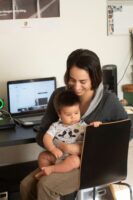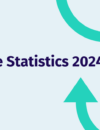
Parenting is just one part of life that has been seriously impacted by the Covid-19 pandemic. From managing children’s mental health to aiding their development while homeschooling, being a parent has become a full-time job for mums and dads across the UK.
This isn’t easy when you already have a career.
According to Pregnant Then Screwed, a charity focusing on ending the discrimination of pregnant people, 78% of people they surveyed said managing childcare alongside work in lockdown has been a challenge.
The situation has unearthed some ugly truths, and according to some experts – including the UN – the fight for gender equality has been pushed back by decades. In fact, it seems that working mothers, in particular, are bearing the brunt of the pandemic.
Gender imbalance
Back in May 2020, the Office for National Statistics (ONS) reported that there had been a 58% increase in childcare undertaken by men in the first lockdown. A survey run by the Trades Union Congress (TUC) also found that 42% of mums said they were sharing care with a partner or spouse. This sounds positive.
Unfortunately, this balancing act isn’t all it seems. While it’s unclear how many of these surveyed mothers are also juggling work at the same time, it’s safe to say that this still leaves 58 per cent managing alone.
This still leaves women carrying out more of the childcare. Indeed, researchers from Oxford, Cambridge and Zurich universities found that working women in the UK, Germany and the US were doing more homeschooling and childcare during March and April 2020 than men with similar earnings, for all wage brackets.
It’s clear that, while many working mothers have the benefit of sharing the responsibility of childcare with spouses or partners, things are still not equally balanced. More women are dealing with things alone, facing the extra complications of asking for flexible hours or extra time off to cope.
Interestingly, this raises the question: is society itself worsening this imbalance? Mum of two Alana (whose name has been changed for the purposes of this blog post) wonders if it may be that men are just not able to, or feel they can’t, ask for flexible hours to help with the childcare more.
“My husband feels that he cannot ask to change his hours or adapt his day to support the homeschooling,” she explains – suggesting things still aren’t equal in the workplace when it comes to paternal flexibility.
Mum’s mental health
The news is heavy with information about how problems with mental health have spiked in the last year. Mumsnet conducted a survey that revealed 76% of women felt that their mental health had been negatively impacted by the pandemic.
For working mothers, in particular, it’s a huge problem; they are 45% more likely than the general population to have suffered mental health problems during 2020’s two lockdowns, according to an Ipsos MORI poll.
The pressures working mothers are under is having a major effect, and it’s unclear what the lasting impact of this will be.
“I cried both times when they announced the school closures,” shares single mother, Cassie (whose name has also been changed for the purposes of this blog post). “The first time was because the severity of the situation hit me. The second time around, my anxiety kicked in on a whole new level because I knew what was coming.”
Career progression and unemployment
Alongside the pressure of taking on the majority of the childcare, and the struggle with managing mental health, working mothers are also experiencing problems at work; namely a cessation in career progression, furlough issues, stigma, and even unemployment.
The BBC states that “female workers have consequently lost their jobs or been furloughed at a higher rate than men”. While not all female workers are parents, there is further evidence to suggest that parental responsibilities have been a major catalyst for this problem.
Pregnant Then Screwed has revealed that 46% of people who had lost their job and suffered redundancy said they believed that childcare played a role. They also found that 72% of mothers had to reduce their hours as a consequence of childcare issues, and 65% of furloughed mothers say that lack of childcare was a significant reason for being placed onto the government’s job retention scheme.
If this isn’t enough evidence to suggest that working mothers are struggling to cope, the Institute for Fiscal Studies (IFS) revealed that British mothers are 23% more likely than fathers to experience redundancy, both permanent and temporary, during the global pandemic.
And it’s not just the immediate impact on their career; while the UK has been working towards equality in the workplace for decades, the last twelve months may have set women back in their job progression. Pregnant Then Screwed has data on this, too: over half of working mums believe that dealing with more childcare responsibilities will have, or has already had, a negative impact on their career prospects.
It seems impossible to artfully balance both home life and work life while the country is in lockdown; but is the pressure coming from employers, employees… or both?
Doing it all
For those working mums who have continued to work throughout the pandemic, there are further challenges.
While the pandemic rages on outside, and the challenge of childcare rages on inside, the requirement to continue performing at the same level as when you had childcare, support, and a healthier and more sustainable working environment, is still there for many; whether it comes from the employer or the working mum.
The TUC again reported that 48% of mums are worried that their employer will treat them negatively due to childcare issues. This fear will no doubt manifest in trying to cope and carry on as normal, even though it’s almost impossible.
The pressure to consistently achieve and be productive while managing everything else has been intense and often debilitating. Many working mothers have often spoken of the desire or need to ‘do it all’ even in a pre-pandemic world; but now, there’s even more to consider. On top of the lion’s share of the childcare, and coping with work, there is also the need to look after your wellbeing, navigate life admin, look after other loved ones and maintain relationships.
As Cassie puts it: “The juggle is real!”
She adds: “The life-long guilt of being a working parent is exacerbated. You feel like you are failing as a parent because you can’t give the kids the level of attention they want or need, and also failing as an employee because you aren’t focusing on work at the level that you expect of yourself.”
Alana agrees.
“The hardest bit is my brain is full,” she says. “I’m trying to keep up with the expectations placed upon me – to teach my child, breastfeed my baby, clean my house, pay my bills, support my friends, keep in touch with colleagues, be an effective employee, volunteer, smile at the delivery man and make sure the whole thing isn’t worrying the children.”
Everything else
It feels almost impossible to explore every single challenge working mums face in the current climate. For example, self-employed mums have the added stress of losing out on financial support packages due to periods of maternity leave. Mothers who are also teachers are facing a whole different kind of mountain as they try to teach a class full of children online while attempting to homeschool their own at the same time. Women who have become mothers over the last year feel cheated out of their maternity leave or are faced with uncertainty about returning to work, possibly feeling unsupported or unable to cope.
For working mums, it’s keeping up with their children’s online calls and deadlines alongside their own. It’s the lack of ‘me-time’, the guilt, the challenges of ensuring your kids have the right technology, space and support. It’s the difficulty of supporting children with extra needs. It’s working late nights and weekends to try and fit in the hours. It’s having to request furlough because the children can’t be at home alone while you’re out and about doing your job.
Many parents, including working mums, are at the end of their tether.
“I am lucky to have an understanding and flexible employer,” adds Cassie. “But I know so many working parents who don’t. They are burnt out, and there is no immediate end to the situation either, which makes it feel more exhausting.”
Staying hopeful
While these stats and stories offer a somewhat gloomy outlook for gender equality, this situation does highlight that there is still so much to be done. While pre-pandemic developments were looking positive, this situation has, at least, unearthed imperfections that need addressing, and has brought discussions on workplace equality back into the foreground.
They say there’s no rainbow without a storm, and hopefully, after the ferocity of this tempest, the future of gender equality in the workplace will be very bright indeed – so long as the work is done.





